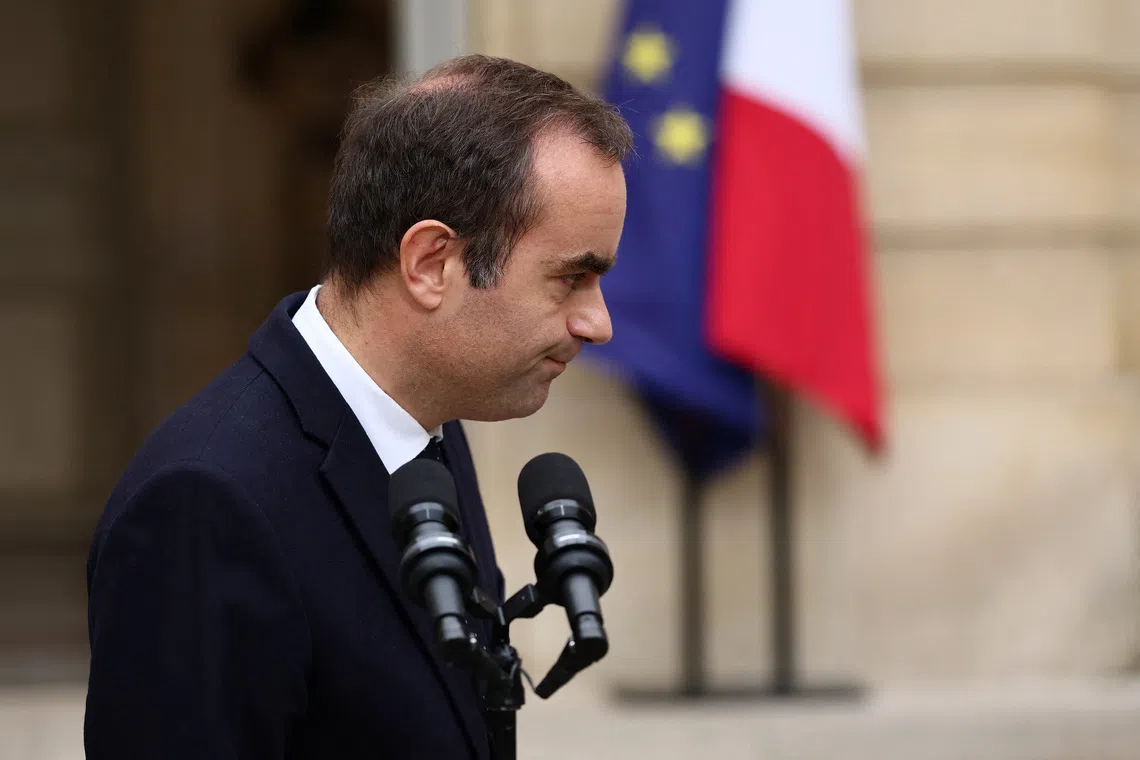France’s Macron pressed to end political mess or resign
Sign up now: Get ST's newsletters delivered to your inbox

Mr Lecornu tendered his and his government’s resignation on the morning of Oct 6.
PHOTO: REUTERS
Follow topic:
PARIS - French President Emmanuel Macron faced growing pressure on Oct 7 to resign or hold a snap parliamentary election to end political chaos that has forced the resignation of five prime ministers in less than two years.
The 47-year-old centrist President has repeatedly said he will see out his second term, which ends in 2027.
But resignation calls, long confined to the fringes, have entered the mainstream during one of the worst political crises since the 1958 creation of the Fifth Republic, France’s current system of government.
On Oct 7, as Mr Macron’s outgoing Prime Minister Sebastien Lecornu held last-ditch talks to form a new government, his first premier in 2017, Mr Edouard Philippe, said it was time for a new president to break the deadlock.
Speaking to RTL radio, Mr Philippe said Mr Macron should be “leaving in an orderly manner” to allow a way out of the crisis.
Political turmoil in the euro zone’s second-largest economy was front-page news across Europe at a time when US President Donald Trump is demanding the continent do more to shore up its own defences and aid Ukraine.
Markets have taken fright, with investors keeping a close eye on France’s ability to cut a yawning budget deficit.
“It’s a mess. It makes you sad,” said Ms Brigitte Gries, a 70-year-old pensioner in Paris, summing up public consternation.
“We’re becoming a bit of a laughing stock around the world right now,” said taxi driver Soufiane Mansour in the southern city of Montpellier. “We’re a bit of a clown around the world and in Europe, unfortunately.”
Allies round on Macron
Mr Philippe, whom polls show to be the best-placed candidate to lead the political centre in a succession battle, was the second of Mr Macron’s former prime ministers to distance themselves from him in as many days.
Mr Gabriel Attal, another erstwhile Macron loyalist, was blunt in his criticism. He was prime minister for a few months in 2024 before Mr Macron called a snap vote that delivered a hung Parliament with three ideologically opposed blocs.
“Like many French people, I no longer understand the President’s decisions,” he said on TF1 TV, after Mr Macron asked Mr Lecornu, who had just tendered his resignation, to go back to opponents
Mr Lecornu, whose 14-hour-old administration was the shortest in modern French history, was given two days to find consensus.
Mr Attal, however, ruled out calling for Mr Macron to resign, said someone who took part in a meeting of his parliamentary group.
Politicians of various stripes expressed confusion about the president’s moves, with some arguing that Mr Lecornu’s new task was merely an effort to buy more time nearly a month after the outgoing prime minister’s nomination.
Far-right snubs
Meanwhile, Mr Lecornu held talks with leaders of Mr Macron’s centrist alliance and conservatives, in which they agreed that finding a deal on next year’s budget was a priority.
He will need others, including the Socialists, on board to have the numbers needed to form a majority in the National Assembly, not least to pass a budget for 2026.
Mr Lecornu now plans to talk to the opposition in the afternoon and early on Oct 8, but the far-right National Rally (RN) said they saw no point in those talks and would skip them.
Party chiefs Jordan Bardella and Marine Le Pen instead “reiterate their call for the dissolution of the National Assembly”, the RN said.
The RN tops opinion polls, but those surveys show a repeat election would likely produce another divided Parliament, with no group holding a majority.
France’s current political crisis
After the far-right surged in European Parliament elections, Mr Macron announced snap elections for the lower parliamentary house.
The result was a fractured Parliament with no clear majority – in a country with a government designed to have a powerful president with a strong parliamentary majority, and little history of building coalitions and consensus.
Mr Lecornu was Mr Macron’s third prime minister since those elections were called, and Mr Macron’s options are now limited.
The president could name a new prime minister. The Socialists have urged Mr Macron to name a prime minister from the left, which he has resisted because a leftist prime minister would likely seek to roll back his pension overhaul and tax changes.
Mr Macron is also not barred by the Constitution from naming Mr Lecornu, a close ally, again.
Opposition parties have also called on him to dissolve Parliament or resign. Mr Macron, whose term ends in 2027, has so far ruled out stepping down or calling new parliamentary elections.
The head of the Medef business chiefs lobby Patrick Martin told Franceinfo radio on Oct 7 that the political crisis “adds to the concern that already existed within our ranks”.
“We are witnessing this political spectacle that saddens us and we are calling for a sense of responsibility on the part of all political players,” he said. REUTERS

